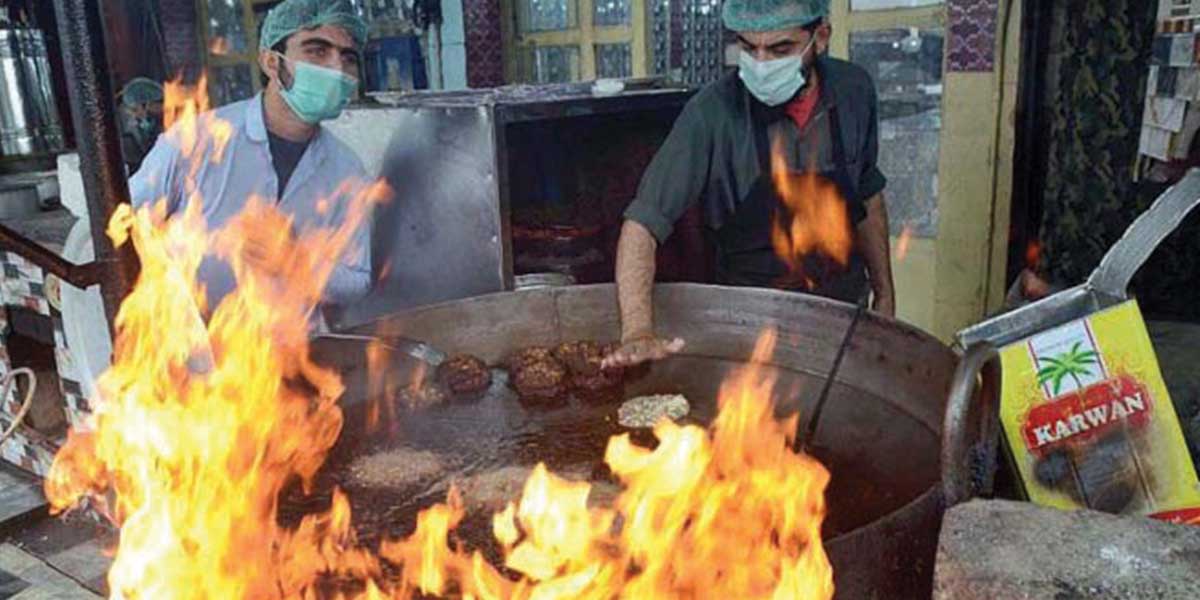Synopsis
The chappli kebabs are being sold at Rs550 to Rs600 per kg during Ramazan in Peshawar as compared to its usual price range of Rs450 to Rs500 per kg

No haggling can be done with the 45-year-old Arif Ahmad, a famous chappli kebab seller in the city, who remains as busy as a bee to keep up the deluge of parcel orders of ‘rozaydars’ (fasting persons) for Peshawar’s traditional cuisine just prior to the Iftar (breaking of fast).
Arif Ahmad, who looks well composed saddled up in a high armchair amid hustle and jostle of shoppers at his shop established by his grandfather Jumma Khan in the year 1950, works against the clock to meet the takeaway and home delivery orders that usually weigh from one kilogram to five kg.

While at business in his two-storied famous shop in front of the Kanumgam Park, he said, “these days most of the chappli kebab lovers ask for parcels for Iftar parties at home”.
“I inherited this business from my father Jalal Ahmad after he took over from his father Jumma Khan.
“My grandfather had started this business from a single ‘karahi’ 72 years ago and today by the grace of Allah Almighty, me and my brothers — who all are in the same business, have six more shops including one at the Melody food street in Islamabad, two each at Firdous and University Road, one each at Gul Bahar and Faqirabad in Peshawar”, he informed.
“We use minced meat and once it is rightly crushed, tomatoes, red chili powder, onions, dry coriander leaves, eggs, ginger, lemon juice, salt, masala and pomegranate seeds go into its marinated meat to make it more delicious”, he said, and added that it takes only 10 minutes to make a complete chappli kebab served with chutney, ketchup, salad, yogurt and nan to the customers.
An eminent writer and traveller, Qari Javed Iqbal in his book ‘Saqafat Sarhad Tarikh kay Ayeene Me’ (Frontier culture in the mirror of history) wrote that people of united India were mostly vegetarians but all kings and invaders from the West including Mughals, Turks, Ghazni and Afghans who conquered India were carnivores. They introduced the habit of eating meat in new ways and customs in the united India.
Before marching towards India, he said the kings, warriors and invaders had stayed in Peshawar and introduced the chappli kebab’s recipe, which had later gained international fame owing to its appetizing aroma and delectable taste.
The recipe was later shifted to Karachi, Lahore, Quetta and other cities of Pakistan besides Jalalabad and Kabul in Afghanistan and Amritsar, Lucknow and Delhi in India.
In Peshawar, more than 3,000 chappli kebabs’ small and big outlets exist currently out of which mostly are at the Firdous, Bakhshu Bridge area, Warsak Road, Ring Road, Nothia, Namak Mandi, Hastnagri, Ramadas, Faqirabad and Board bazaars.
“Chappli kebab is my favourite dish and my Iftar seems incomplete without tasting its aromatic bites”, said Khushal Khan, a resident of Nothia Peshawar while talking to APP at the famous chappli kebab shop at the Qissa Khawani bazaar.
The chappli kebabs are being sold at Rs550 to Rs600 per kg during Ramazan in Peshawar as compared to its usual price range of Rs450 to Rs500 per kg.
Besides chappli kebab, Arif said, the takeaway service of traditional cuisines including Peshawari rice pulao, paye, dampokh, Namak Mandi karahi, lamb chops, BBQ and other traditional foods are also booming during the holy month.
He apprised that people also send food parcels to the UAE, Saudi Arabia and other countries.
Abdul Sattar, Director Technical Food and Scientific Affairs, Food Services and Halal Authority, Government of Khyber Pakhtunkhwa (KP) told APP that countering of adulteration in the spices; mostly used in traditional cuisines including chappli kebab, paye, dampokh and mutton karahi, is a big challenge.
He informed that three foods training schools in Mardan, Peshawar and Abbottabad have almost been completed to do the needful. He underscored the need for establishment of nutritional wings, food screening laboratories and halal food research wings in all districts besides inclusion of food subjects in the curriculum and constant awareness campaign by media and religious scholars necessary to win fight against the menace of adulteration in milks and food products.
Qaiser Khan, Assistant Director and Spokesman of the KP Food Authority said that crackdown against adulteration in food items and milk was underway in the province where 48,058 kg/litre adulteration goods including spices, ice cream, beverages were disposed of during April 1-15, 2022. He emphasized that it was mandatory for hotels and food restaurants to ensure hygiene of kitchens and eatery halls.
He also laid emphasis that the chefs should have a license ensuring that they have no communicable disease.
Catch all the Breaking News Event and Latest News Updates on The BOL News
Download The BOL News App to get the Daily News Update & Live News.












 Read the complete story text.
Read the complete story text. Listen to audio of the story.
Listen to audio of the story.